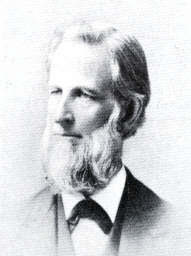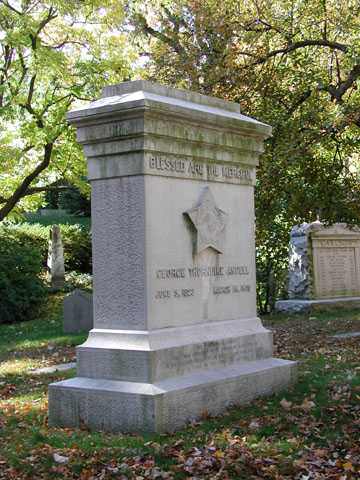George Angell (1823-1909)

George Thorndike Angell, founder of the MSPCA, was born on June 5, 1823 in Southbridge, Massachusetts. He was the son of a schoolteacher and a Baptist minister.
Angell’s father died when he was four years old, leaving the family in poverty. Angell was shuffled between homes throughout New England while his mother, who taught in private school for girls, saved enough money to send him to preparatory school when he was 14. He went to Brown University in 1842 but soon transferred to Dartmouth. In 1846 he returned to Boston to teach and study law.
In 1849 Angell entered Harvard Law School and practiced law for fourteen years after being admitted to the bar in 1851. In 1868 he read about two horses whose riders raced them forty miles between Brighton and Worcester to their deaths. The account enraged him and he sought to rally support against animal cruelty through a letter to The Boston Daily Advertiser. Emily Appleton (Lot 469 Woodbine Path), a socialite and animal lover, contacted Angell, and the two established the Massachusetts Society for the Prevention of Cruelty to Animals (MSPCA). Only 12 weeks after the fatal horse race, Angell had already managed to pass Massachusett’s first anticruelty laws through the State congress.
Angell was the organization’s first President in 1868, and the first board members included William Appleton, John Quincy Adams, Ralph Waldo Emerson, and Samuel Gridley Howe. He also coined the motto for the organization: “Glory to God, Peace on Earth, Kindness, Justice and Mercy to Every Living Creature.” Our Dumb Animals, the first periodical dedicated to the MSPCA mission, was published by Angell in 1868. He lobbied for anti-cruelty legislation in Massachusetts and helped pass the state’s first anti-cruelty laws in 1868. Just three years after the founding of the MSPCA, anticruelty laws had been passed by State congresses from coast to coast.
In 1871 Angell retired from law to focus on MSPCA work. He created the American Band of Mercy in 1882, a group for children who pledged their kindness and protection to animals. In 1890 he arranged for the publication of Anna Sewell’s Black Beauty and distributed two million free copies to members of the Band of Mercy. He continued advocating for animals, including creating a petition for legislature to reform animal treatment practices in cattle markets.
Angell was also part of the anti-vivisection movement, and against the adulteration of foods and the use of toxic materials in household products. He died on March 15, 1909, and his funeral procession included two lines of 38 white horses. He was buried with his wife, Eliza Martin Angell. His monument bears the inscription “Blessed are the Merciful,” reflecting his commitment to the American Band of Mercy.

George Angell is buried at Mount Auburn in Lot 4738 on Poplar Avenue.
Adapted from the research of Judy Jackson and Jill Graboski, as published in Mount Auburn’s June Birthday: George Thorndike Angell, 2005.
Leave a Reply